
Search
Para ver este artículo en Español, haz clic aquí
A 2018 DHL and Euromonitor Consulting analysis of strategies for improving last mile management of goods delivery, pointed to a number of success factors, which apply to supply chain logistics in emerging as well as developed markets:
“Capturing delivery segments, aggressive management of expenses while operating under slim margins, utilizing technology whenever possible, and pursuing alternative labor models are all potentially decisive measures,” for “shortening the last mile,” according to the DHL whitepaper.
Solar energy provider Ilumexico and The BOMA Project, an NGO that operates a Poverty Graduation Program in Kenya’s northern arid lands, are using TaroWorks’ mobile field services app and companion Salesforce.com cloud database to track expenses incurred by field teams and gauge how remote staff spend their time. The data is then analyzed to increase worker productivity and inform business decisions that can now be made in real time.
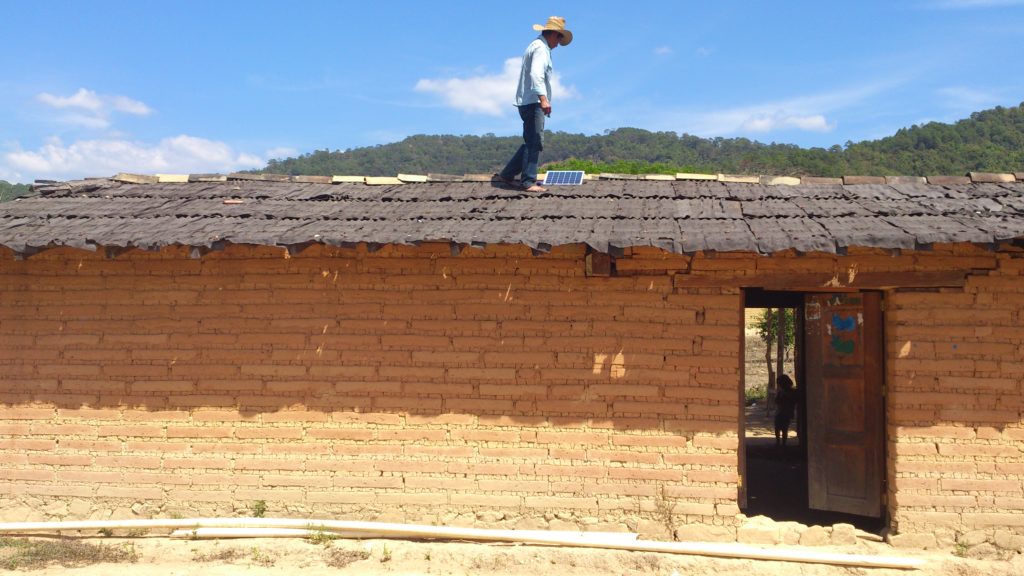
TaroWorks built its offline CRM for social enterprises and nonprofits to better coordinate last mile management of their field agents. Normally, that means helping with business processes as they interact with end-clients, like registering members of a savings group, tracking product sales or handling product maintenance requests. However, we saw that more and more of our clients were using TaroWorks to track their field agent expenses and manage costs related to these agent networks.
Ilumexico teams travel to remote villages to provide last-mile customer care, inclusive financing, assistance in finding the appropriate solar system for their customer’s needs and to create a network of customer care agents from local communities. During a recent TaroWorks webinar on last mile management, former Ilumexico IT Coordinator Jack Atkinson-Willes explained that to ensure their last mile customer care works well, the social enterprise developed a network of 12 branch offices throughout Mexico called ILUCentros.
Each ILUCentro has Community Engineers who train local talent to promote, sell, install, and provide technical assistance for solar products. There are also Community Ambassadors, who provide closer points of contact and facilitate payment collection activities.
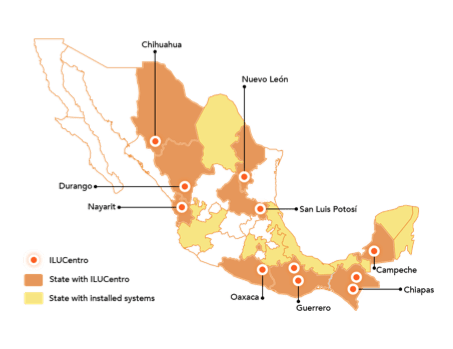
Ilumexico, which has been using TaroWorks’ mobile field force app since 2013, has made TaroWorks a central component of its internal processes for last mile management over the past few years. They’ve used TaroWorks for registering solar system sales, recording data from community visits (i.e. logging status of equipment, payments received, etc.), registering receipt of deliveries in their manufacturing plants, and tracking expenses.
Each ILUCentro has their own clients, plans, and budgets. As part of staying on top of their finances, Ilumexico needs to track the expenses incurred by their teams. They do this using two business processes set up in TaroWorks:
Both processes use the same underlying expense form, but are set up differently because the information must be reported in the Salesforce database system uniquely. Due to the frequency at which field officers must report expenses, these TaroWorks-built expense forms are by far the most used form used across the company, with over 70,300 submissions to date.
Because it’s used so frequently, Ilumexico has streamlined the data collection and reporting task within TaroWorks so it’s easy to fill out by an Ilumexico team member and for that person to assign recorded expenses to the right budget in Salesforce.
“The survey has been designed to be as simple and as brief as possible, “ said Atkinson-Willes during the webinar. “… a simple survey reduces the reluctance that the field officer may have to use the survey, meaning they report expenses regularly and on time.”
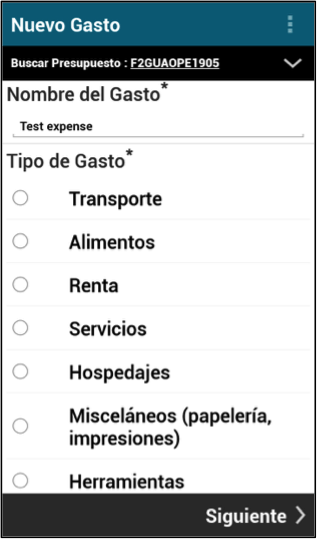
A field agent selects their ILUCentro (field office), then selects a specific project budget from a list of budgets assigned to that particular ILUCentro. If the field agent is unsure about whether the budget is the right one, they can open the budget details to confirm. As an additional fail-safe, Ilumexico has included a filter to only allow field agents to choose budgets that have an “active” status. In the mobile app form itself, the budget is pre-populated based on the field agent’s previous selection.
As information gets uploaded from the field, managers are able to view all details and take further processing steps, such as approving the expense. By looking across the organization’s expenses, management is able to monitor expenses, report on spending and make business decisions. Below are 2 examples of what can be monitored from within the Salesforce cloud database.
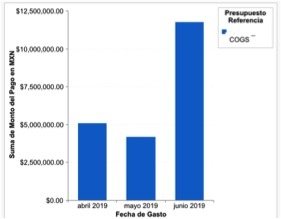
This type of information helps Ilumexico analyze whether they’re overspending in certain areas, so they can keep costs under control. One lesson learned from using mobile and cloud technology to track their field agent expenses and budgets is that using drill-downs to select budgets avoids erroneous input of complex budget codes.
The BOMA Project is a U.S. nonprofit and Kenyan NGO that works to provide ultra-poor women living in the arid and semi-arid lands of Northern Kenya with the educational, financial, and technological resources to help lift themselves out of poverty. Its mission is to assist vulnerable populations overcome extreme poverty and achieve social and economic inclusion. BOMA does this using a high-impact, women-focused poverty graduation model.
BOMA Project uses TaroWorks and Salesforce to digitize a range of business operations and monitoring and evaluation methods including program participant targeting and registration, data collection on beneficiaries at entry to and exit from the 2-year graduation process, performance monitoring of businesses launched by the women entrepreneurs and tracking of loans issued by program savings groups. (Read More)
As some of BOMA Project’s donors require monthly timesheets be filled out to indicate how field staff time is spent on various programs, there was a need to make the weekly timesheet reporting easy for team members operating in remote areas with little or no connectivity.
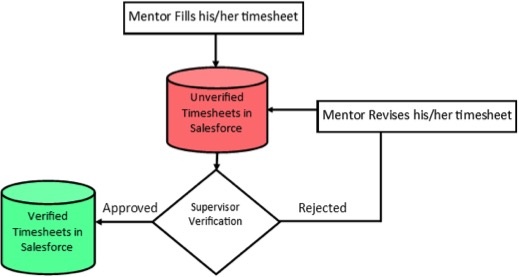
A process was created and then digitized that allows program mentors guiding the program participants to input their hours spent – even if they are offline – on the mobile device-based TaroWorks data collection form and subsequently upload the data to their Salesforce database when they are within range of WiFi or a mobile data signal. Mentor supervisors can then review and either approve or reject the report (if information is incorrect or not complete).
Reports are run on the data from within the Salesforce cloud database but according Bill Owiti, BOMA Project’s Assistant System Administrator:
“We don’t only stop at running reports about this. We want this to inform management (for) making decisions…about how our field staff spend their time in the field,” he said during the webinar.
For example, Owiti said that an analysis of timesheets indicated BOMA field staff often took their paid time off on Thursdays and Fridays of any given week, which helped BOMA plan staffing and forecast future needs. This business insight can be filtered by the region in which each mentor operates.
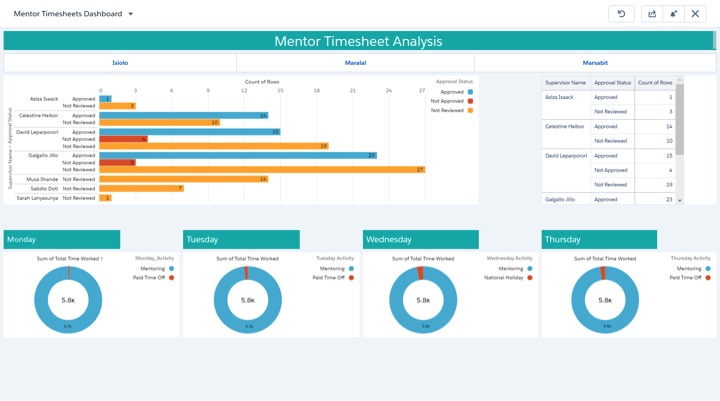
TaroWorks and Salesforce are also used to track vehicle mileage and fuel logs. Mobile data forms completed by drivers on their Android tablet allow the organization to identify the driver and vehicle used for any trip and other information including the travel date, trip origin point and destination point, purpose of the trip, program and donor related to the trip, route taken as well as starting and ending odometer readings. The tracking process even includes a checklist to determine if each vehicle has the requisite safety equipment onboard – such as a first aid kit, spare tire and jack, fire extinguisher, flashlight, shovel, etc.
Finally, information can be added to identify passengers and get signatures from everyone in the vehicle and the driver can indicate any problems that occured with the vehicle during the trip, which will automatically send out an alert to other BOMA Project personnel who can follow-up. BOMA Project Assistant System Administrator Owiti said during the webinar that there are plans to eventually capture GPS location of the vehicles at the beginning and end of each trip to get a clearer picture of each journey.
“By automating these mileage fuel logs…the management at a glance can know how much to bill each donor on fuel and mileage expenditures,” Owiti said – while also informing future decisions by management. At the same time, “the tedious paperwork on filling of these forms by the drivers” is reduced.
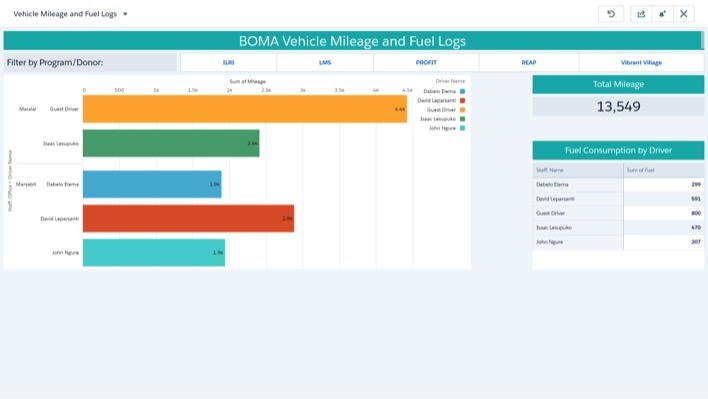
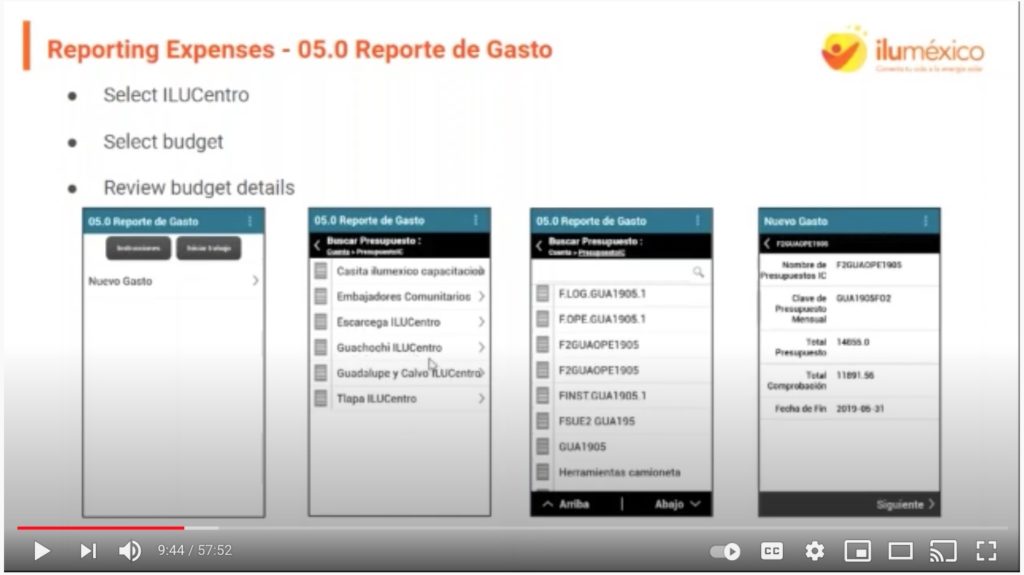
POST TOPICS
Sign up to receive emails with TaroWorks news, industry trends and best practices.
TaroWorks, a Grameen Foundation company.
Site by V+V